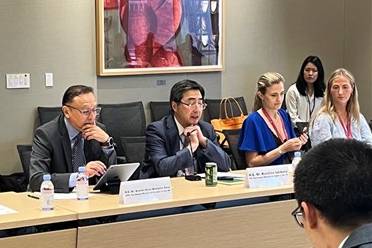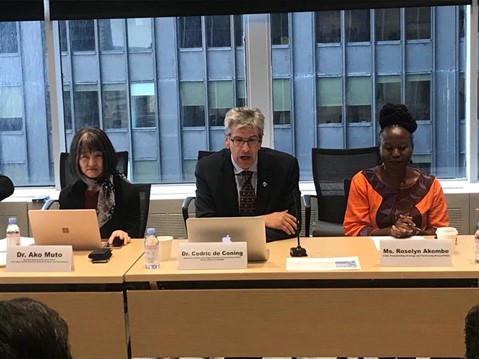Presenting Adaptive Peacebuilding at a Seminar—Towards More Context-specific, Participatory, and Adaptive Approaches to Conflict Prevention and Sustaining Peace
2023.11.01
On June 26, 2023, Muto Ako, a specially appointed research fellow at the JICA Ogata Sadako Research Institute for Peace and Development, together with Cedric de Coning, a research professor at the Norwegian Institute of International Affairs (NUPI), participated in a seminar titled "Towards More Context-specific, Participatory, and Adaptive Approaches to Conflict Prevention and Sustaining Peace." The seminar was organized by the Permanent Mission of Japan to the United Nations and was co-sponsored by the Permanent Mission of Ecuador to the United Nations and the Permanent Mission of Norway to the United Nations. Members of both the United Nations Security Council and the Peacebuilding Commission were invited to attend the seminar.

Ambassador Extraordinary and Plenipotentiary Ishikane Kimihiro,
Permanent Representative of Japan to the United Nations (center)
Ambassador Extraordinary & Plenipotentiary Ishikane Kimihiro, Permanent Representative of Japan to the United Nations, delivered the opening remarks. Next, lead editor Cedric de Coning introduced the book, Adaptive Peacebuilding: A New Approach to Sustaining Peace in the 21st Century. He elucidated that it is an approach to peacebuilding that is informed by how complex social systems adapt to shocks and setbacks, such as violent conflict or the adverse effects of climate change. He emphasized that it is an approach in which peacebuilding actors, including members of local communities and conflict-affected individuals would shape peace-sustaining procedures by participating in the iterative process of collaborative exploration, learning, and adaptation. According to de Coning, adaptive peacebuilding is grounded in the self-organizing dynamics of social systems to ensure that peace emanates from local contexts. This methodology attends to the needs of local actors, cultures, and socio-economic circumstances.

Muto Ako, specially appointed research fellow at the JICA Ogata Research Institute (left),
Cedric de Coning, research professor at the Norwegian Institute of International Affairs (center), and
Roselyn Akombe, chief of the United Nations Peacebuilding Strategy and Partnership Branch/PBSO (right)
Then, co-editor Muto Ako presented five case studies (Colombia, Mozambique, Palestine, Syria, and Timor-Leste) and outlined the peacebuilding approaches applied in these countries/regions to introduce the book’s context-specific and participatory perspective of adaptive peacebuilding. She noted that adaptive peacebuilding adopted different context-specific and participatory approaches in every case study. She stated that the case studies evidenced that adaptive approaches are more useful than the externally driven and determined designed peacebuilding approaches.
Subsequently, Eugene Chen, director of the Crisis Prevention and Peacebuilding program at the Center on International Cooperation at New York University commented on the book. In his view, the United Nations has found it difficult to shift toward adaptive approaches for two principal reasons. First, the United Nations works in silos across the areas of humanitarian aid, development assistance, and peace operations. Second, bureaucratic structures and administrative policies and practices drive organizational cultures that default to templated approaches.
Thereafter, the seminar participants discussed the concept of adaptive peacebuilding and deliberated on how the systems and agencies of the United Nations could use an adaptive approach to collaborate beyond the existing stove-piped mechanism and tackle the root causes of conflict. Roselyn Akombe, chief of the United Nations Peacebuilding Strategy and Partnership Branch/Peacebuilding Support Office (PBSO) delivered the concluding remarks.
The seminar aimed to discuss the following questions. How can the United Nations effectively prevent conflict and sustain peace? How can UN peace operations, agencies, funds, programs, and member states support the peacebuilding and prevention efforts of specific countries? How can support for conflict prevention and peacebuilding efforts become more context-specific, participatory, and adaptive? How can the Security Council and the Peacebuilding Commission lead the promotion of conflict prevention and peacebuilding endeavors?

事業事前評価表(地球規模課題対応国際科学技術協力(SATREPS)).国際協力機構 地球環境部 . 防災第一チーム. 1.案件名.国 名: フィリピン共和国.

事業事前評価表(地球規模課題対応国際科学技術協力(SATREPS)).国際協力機構 地球環境部 . 防災第一チーム. 1.案件名.国 名: フィリピン共和国.

事業事前評価表(地球規模課題対応国際科学技術協力(SATREPS)).国際協力機構 地球環境部 . 防災第一チーム. 1.案件名.国 名: フィリピン共和国.

事業事前評価表(地球規模課題対応国際科学技術協力(SATREPS)).国際協力機構 地球環境部 . 防災第一チーム. 1.案件名.国 名: フィリピン共和国.

事業事前評価表(地球規模課題対応国際科学技術協力(SATREPS)).国際協力機構 地球環境部 . 防災第一チーム. 1.案件名.国 名: フィリピン共和国.
scroll